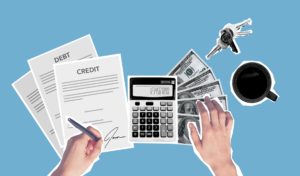Yes, you can get a loan with Dime Alley even if you are unemployed or self-employed! With 6.88 million unemployed citizens in the US, there are plenty of options if you need money now but are unemployed.
Payday loans can be a great option if you need to borrow money fast and for short-term reasons for things such as bills, repairs or for debt consolidation, however, it can admittedly be trickier if you are unemployed, and it is usually more difficult than getting a loan while you have steady income from a job.
Whether you are unemployed unexpectedly or by choice (in the case of retirement), lenders will consider extending you a loan as long as you can demonstrate to them that you can make regular payments on time. At the end of the day, they want to know that their money is in safe hands with you.
Key Points:
- It will be difficult to acquire a loan if you are unemployed.
- However, for the 6.88 million unemployed US citizens there are alternatives to payday loans, such as Credit Union loans, which offer low APR rates of around 8.86%.
- Demonstrating a strong credit history or reassuring investments may encourage lenders to offer you a loan.
- With about 6% of borrowers defaulting on payday loans, having a regular income is helpful for repaying your loan and preventing further costs and damage to your credit record.
What Loans Can I Take Out If I Am Unemployed?
It is much more difficult to qualify for a payday loan if you are unemployed, and often lenders will require you to post collateral in order to be accepted for a payday loan, such as your house or vehicle. However, there are other loan options available for unemployed people.
Credit Union Loans
If you are unemployed, you could consider applying for a loan at a local credit union, with over 5,000 credit unions operating in the US in 2020.
Credit unions often have competitive APR rates, with the average three-year credit union loan in March 2021 being 8.86%. Credit unions may also have lower credit score requirements than banks. If they extend a loan offer you want to take, you’ll have to become a credit union member before the loan is processed.
Membership usually requires an open account with at least a few dollars in it—a small price for a good deal on a loan, explaining why 122 million Americans were members of credit unions in 2020.
Borrowing From Family Or Friends
Borrowing from a family member can provide emergency money and help you avoid borrowing at very high interest rates. These loans are often more flexible, too, as your friends and family know you and your situation, and should trust you on a personal level.
However, there might be a risk that this could harm or even end the relationship if you don’t repay or take longer to repay what you borrow.

How Can I Qualify For A Loan If I’m Unemployed?
In order to have a chance of being successful in your application for a payday loan as an unemployed individual, lenders will want to see:
A Reassuring Credit History
Lenders will be looking for a pattern of timely payments when they review your credit report.
If you have very few or even no late or missed payments (especially in recent years), this can reassure lenders that you manage debt responsibly. Most lenders also prefer credit reports that are free of negative events such as bankruptcies or foreclosures.
Good Credit Score
Lenders typically set minimum credit score requirements for different types of loans, and they reserve their best loan offers—the ones with the lowest interest rates and fees—for borrowers with credit scores in the very good or exceptional ranges.
Credit scores are calculated using data from your credit reports, so if your credit history is in good shape, your credit score has a solid foundation.
Before you apply for a loan, you may be able to increase your score, and fairly quickly (within a few months). You can achieve this by paying down any credit card balances that exceed 30% of their cards’ borrowing limits.
Regular Income
The bottom line here is that lenders need to know you’ll be able to make your loan payments each month.
It doesn’t have to be from a paycheck, but you must have one or more sources of income that are reliable and sufficient to cover your monthly expenses, with enough left over to cover your loan payments.
Spouse’s Income
If you’re married and the lender allows it, you may be able to include your spouse’s income on your loan application. This may be allowed if you can use that income to help repay the loan.
You may need to include your spouse as a co-applicant if you choose to include their income as a source of income.
Investments
Capital gains or money from investments like real estate could help indicate your ability to repay your loan.
One-time capital gains might not be considered, but recurring income from dividends or rental properties may be allowed if the lender approves.
Debt-To-Income Ratio
Another factor that lenders may consider in determining whether you have the ability to repay a loan is your debt-to-income ratio.
Mathematically, this can be calculated by dividing your total monthly debt payments by your gross monthly income. Your gross income is generally your income before payroll deductions like taxes and insurance.
If your debt-to-income ratio is too high, a lender may use this as an indication that you may not have enough income to pay both your debts and day-to-day expenses.
Risks of Borrowing While Unemployed
Taking out a payday loan comes with risks for both the borrower and the lender if you cannot repay the loan while unemployed. Some of these risks can include:
Missed Payments
One of the obvious worst-case scenarios when you take out a loan without a job is not being able to pay for the loan.
Failing to pay back a loan can damage your credit, lead to collections and make an already challenging financial situation even tougher.
Higher Interest Rates
If your income is low, you could still get a loan — but it’s more likely to come with a higher interest rate. Higher interest rates mean higher overall loan costs.
Shorter Repayment Period
If a lender determines that you’re a riskier borrower, you may be limited to loans with shorter repayment periods. That’s because a lender is less likely to believe your financial circumstances will change in the short term.
Overall, getting a payday loan while unemployed is often more difficult than getting a loan while you have steady income from a job — but it might still be possible.
As with any payday loan regardless of your employment status, it’s important to be mindful of the costs and to make sure to think through all your options and possible alternatives. Signing up for a loan you can’t afford could make your financial situation even more challenging than it is today.
